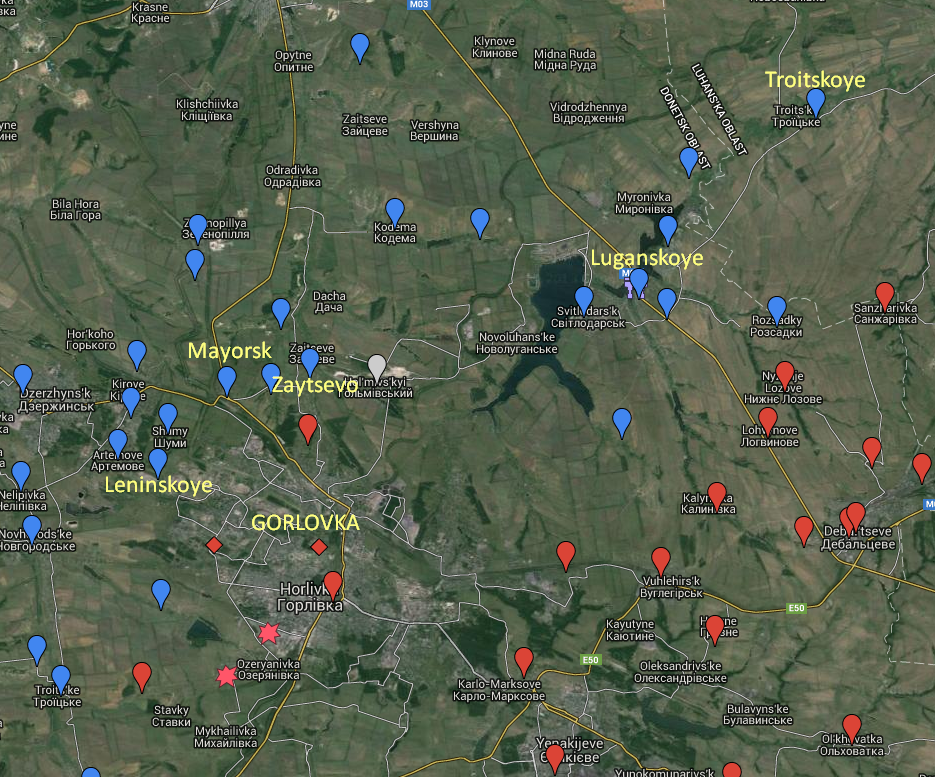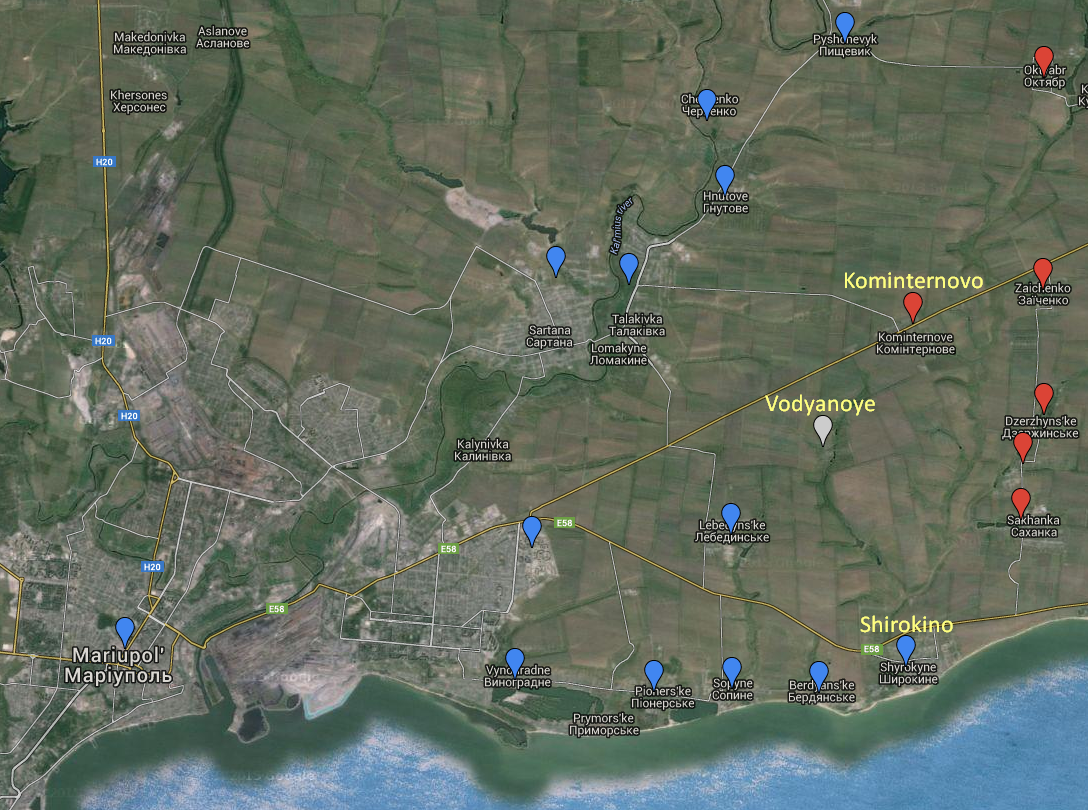One Ukrainian soldier has been killed and another wounded, with Kiev reporting numerous attacks in the Gorlovka and Mariupol areas.
Yesterday’s live coverage of the Ukraine conflict can be found here.
Please help The Interpreter to continue providing this valuable information service by making a donation towards our costs.
For links to individual updates click on the timestamps.
For the latest summary of evidence surrounding the shooting down of flight MH17 see our separate article: How We Know Russia Shot Down MH17.
- READ OUR SPECIAL REPORT: An Invasion By Any Other Name: The Kremlin’s Dirty War in Ukraine
President Vladimir Putin appointed Gryzlov late last year to represent Russia in the Trilateral Group, making an official announcement on the government portal.
This represented a significant new level of engagement for Russia, as before that, only Amb. Mikhail Zurabov, Russia’s envoy to Ukraine, took part in the talks, and then he was replaced last April with Azamat Kulmukhametov. Presidential administration spokesman Dmitry Peskov said at the time that Kulmukhametov’s appointment was meant to “raise the level and enhance specialization of the Russian representation at the talks” and he had the title “special presidential representative.” But Kulmukhametov’s previous resume as a Foreign Ministry staff person included work on Syria, Egypt, Jordan and a period as ambassador to Kuwait from 2003-2008, then ambassador to Syria again from 2011-2014; he had no background in Ukraine, suggesting that geopolitics, not regional ones, were at play.
To be sure, Putin himself participated in the “Normandy Quartet” — talks by the leaders of Russia, Ukraine, Germany and France about implementation of the Minsk agreement — but the ongoing negotiations and drafting of agreements was done by the Trilateral Group, where Ukraine was represented by former president Leonid Kuchma and where the leaders of both self-declared “people’s republics” of Donetsk and Lugansk also took part, under the auspices of the OSCE. That meant that while Ukraine didn’t have a negotiator actually serving in the Poroshenko government, Russia appeared to show disdain for the talks by having representation at a low-level.
The appointment of Gryzlov is meant to bring something of a “parity” with Kuchma, sources told Kommersant.
As Kommesant reported on December 26 citing sources in the Foreign Ministry, there were two other candidates besides Gryzlov for the Trilateral Contact Group position; former Foreign Minister Ivan Ivanov and Sergei Stepashin, former prime minister in the Yeltsin administration and head of the Accounts Chamber. Azamat Kulmukhametov, the person who held the position in the past, would remain in the working group, said the source.
He said that there were leaders in Donetsk seriously looking at this option if they had guarantee of security themselves. But he said Russia would not opt for such a route.
That opens up the question of whether Gryzlov signifies more serious negotiation to end the war in the Donbass in a compromise with Kiev — or higher-level control of the Donbass to ensure the outcome of negotiations best serve Russia’s interests.
In an article for the Atlantic Council web site, Anders Aslund, Swedish economist and senior fellow at the Atlantic Council, says the appointment of Gryzlov may mean “Putin is ready to negotiate.”
According to his information, Kulmukhametov, a “lightweight ambassador,” has simply been replaced — although Peskov said he would remain.
Aslund notes that the DNR and LNR troops were directly subordinated to the Russian Ministry of Defense and the separatist commanders were presumed to be killed by Russian military intelligence because of the professional manner in which it was done.
As we reported a year ago, the Kremlin has struggled with its management of the Ukrainian crisis of its own making, making a number of replacements — and ensuring constant speculation as to whether Vladislav Surkov, formally in charge of relations with South Ossetia and Abkhazia, and not Ukraine, was really involved or not. Aslund notes that last October, changes were made again:
In October, the Kremlin changed its management of the occupied Donbas, though this has not been publicly announced. Several blogs mentioned the change on October 30, and businessmen operating in the area have confirmed the changes. The management passed from the Russian presidential administration to the Russian government. Putin’s personal assistant Vladislav Surkov was replaced by Deputy Prime Minister Dmitri Kozak. Both are Putin loyalists, reporting directly to the President, but Surkov is an aggressive troublemaker who was in charge of the Novorossiya project, while Kozak, a lawyer from St. Petersburg, is in charge of regional affairs, including Russia’s management of its frozen conflict.
Interestingly, after this reported replacement of Surkov in October, both Zakharchenko and Plotnitsky made a point in November 2015 of announcing publicly their gratitude toward Surkov and their allegiance to him; Zakharchenko commented that Surkov had provided advice “on all the fundamental issues” and “support in development and establishment of our republic.”
Earlier Col. Igor Strelkov, who was removed from the DNR, said it was Surkov who had replaced Aleksandr Boroday with Zakharchenko.
Aslund also notes the role Gryzlov played before in the Orange Revolution, and asks if it will be reiterated:
The transition to Kozak and Gryzlov is undoubtedly an important milestone. Kozak’s appointment indicates that Russia has concluded its active military phase and moved on to long-term management of frozen conflicts. The appointment of Gryzlov is more curious. He represented Putin in the roundtable negotiation that led to the settlement of the Orange Revolution with repeat elections in December 2004. If Putin authorized Gryzlov to make substantial concessions to Ukraine then, he might be ready to do so again. The Russian war in the Donbas has been neither small nor victorious, so the best the Kremlin can do is to forget about it. In any case, unlike his predecessor, Gryzlov can negotiate with the authority of the Kremlin.
Says Aslund:
The economic management of the occupied Donbas has changed as well. Under Kozak, Russia’s Deputy Minister of Economic Development for regional development Sergey Nazarov is in charge of the region’s economy. He chairs a Russian working group for humanitarian assistance for the occupied Donbas, involving all the relevant Russian agencies and commanding the governments of the DNR and LNR. Private Russian enterprises do not seem to play any role.
Thus, the Russian federal government swiftly changed from lawless destruction to financing the reconstruction and humanitarian aid in the occupied Donbas. As a consequence, the still-operating companies have inched up their production. DTEK has been allowed to repair the state-owned railways with its own means so that it can transport coal produced in its mines in the occupied Donbas by rail to its power stations in free Ukraine.
— Catherine A. Fitzpatrick
Colonel Andriy Lysenko, military spokesman for the Presidential Administration, announced at noon today that one Ukrainian soldier had been killed and another wounded yesterday in Zaytsevo, north of Gorlovka.
Just 24 hours ago, the Ukrainian military had reported two soldiers killed in the same area.
According to Lysenko, the most recent casualties were incurred when Russian-backed fighters fired on Ukrainian-held areas of the village.
Yesterday evening, the ATO Press Centre reported that Zaytsevo had come fire from grenade launchers and heavy machine guns during the day.
Over the last 24 hours, the military claimed this morning, Russian-backed fighters had conducted 21 attacks.
In addition to the attacks on Zaytsevo, other villages near Gorlovka, including Mayorsk, Leninskoye, and Luganskoye saw attacks with small arms, heavy machine guns, rocket propelled grenades and automatic grenade launchers.
To the east, Ukrainian positions near Troitskoye came under fire from a tank.

To the north of Donetsk, there somewhat fewer attacks than in recent days, with only small-arms fire reported near Avdeyevka and Peski.
But Kiev reports continued escalation in the south. According to the ATO Press Centre, a Ukrainian defensive position outside Starognatovka, west of the river Kalmius, came under attack, while on the Azov coast, Ukrainian troops in Shirokino were fired on with grenade launchers and small arms. The report claims that the troops in Shirokino were forced to return fire.
Around an hour ago, the military claimed that Russian-backed forces had used 82 mm mortars and grenade launchers to shell the village of Vodyanoye, less than 8 kilometres outside Mariupol.

Russian-backed forces were reported to have entered Vodyanoye briefly in December, but the village now lies as one of the last settlements in the “grey zone.”
The attack, the ATO Press Centre reports, took place at around midday. The shelling came from the direction of the occupied village of Kominternovo, to the northeast. Around 10 shells are reported to have fallen on the village.
Meanwhile, the pro-separatist Donetsk News Agency reports that front-line administrations in separatist held territory did not report any shelling by Ukrainian forces last night.
— Pierre Vaux